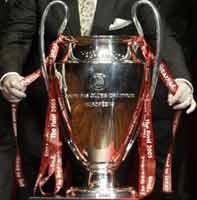Wolverhampton Wanderers manager Stan Cullis's assertion half a century ago that his side were the best in the world provided the catalyst for what has become the greatest club competition in world sport, celebrating its 50th final next Wednesday in Istanbul.
 Surveying his mud-splattered team in the dressing room at Molineux after they had beaten Honved of Hungary 3-2 in a friendly in December 1954, Cullis declared: "There they are -- the champions of the world."
Surveying his mud-splattered team in the dressing room at Molineux after they had beaten Honved of Hungary 3-2 in a friendly in December 1954, Cullis declared: "There they are -- the champions of the world."
Gabriel Hanot, a former French international and editor of the French daily newspaper L'Equipe, was not so sure.
"We must wait for the Wolves to visit Moscow or Budapest before we proclaim their invincibility," he wrote.
"There are other clubs of international prowess, Milan and Real Madrid to name but two," he added prophetically in an editorial, which called for a meeting in Paris and the establishment of a European tournament to prove just who really were the best club in Europe.
Today's Champions League competition is open to those who are not national champions and Hanot's plans for the embryonic European Cup were not just for champions either, but for those clubs who would have the greatest box office appeal.
The rules were simple and basically stayed unchanged until the Champions League era began in 1992-93, with teams playing home and away matches and advancing to a one-off final.
Various limited continental competitions had been in existence for years, such as the Mitropa Cup for clubs in central Europe, but the idea of a competition to establish a European champion quickly took hold of the public's imagination and the early dominance of Real Madrid added a glamour and prestige that no other competition could match.
REAL GLORY
The first match in the competition took place on September 4 1955 when Sporting Lisbon were held to a 3-3 draw by Partizan Belgrade in Lisbon before losing the return 5-2 in Yugoslavia.
The first five competitions were dominated by Real Madrid whose display in the 1960 final, when they beat Eintracht Frankfurt 7-3 in Glasgow, is still regarded as one of the greatest club performances of all time.
That match sealed Real's reputation as the greatest club side in the world with Alfredo Di Stefano scoring a hat-trick.
The other four goals were scored by Ferenc Puskas -- who had been in the Honved side beaten by Wolves back in 1954.
Southern European sides dominated the early years with Benfica, AC Milan, Inter Milan and Real again all winning the trophy before Celtic became the first northern European side to break their domination with their 2-1 win over Inter Milan in 1967.
Manchester United became the first English club to win it the following year with a 4-1 extra-time win over Benfica at Wembley. Apart from AC Milan's 4-1 win over Ajax Amsterdam in 1969, no team from southern European were crowned champions again until Juventus beat Liverpool in the ill-fated 1985 final in Brussels.
In between those Italian victories of 1969 and 1985, the cup belonged to the Germans, the Dutch and the English. Ajax, inspired by Johann Cruyff, won a hat-trick of titles in the early 1970s before Franz Beckenbauer's Bayern Munich matched their achievements with victories in 1974, 1975 and 1976.
Borussia Moenchengladbach failed to pick up Bayern's mantle in 1977 when they lost 3-1 to Liverpool in Rome. The victory started England's six-year rule of Europe which saw Liverpool retain their trophy in 1978 before victories for Nottingham Forest in 1979 and 1980, Liverpool again in 1981 and Aston Villa, who saw off Bayern Munich in 1982.
HEYSEL TRAGEDY
Hamburg SV restored Germany's glory in 1983, but although Liverpool won their fourth title in seven years against AS Roma in Rome in 1984, England's golden era ended in tragic circumstances.
For years Europe had been plagued by English hooliganism and on the night of May 29 1985 the English "disease" reached its nadir thanks to the violence of Liverpool fans.
Their attacks against Juventus fans before the final caused a wall to collapse at the Heysel Stadium in Brussels resulting in the deaths of 39 mainly Italian fans.
English clubs were banned from Europe for five years and, apart from Manchester United in 1999 and Liverpool, who have reached the final this year for the first time since the disaster, England's finest have fared badly in the competition since returning.
The European Cup continued along familiar lines until 1992.
By then the English were back to take part in the new-look Champions League which involved a group stage as well as the traditional knockout rounds.
Initially eight clubs took part in the group stage, then 16, then 24 until in 1999-2000, the current format was adopted with 32 clubs.
No one side has been able to dominate the opening years of the new era in the way that Real Madrid did in the 1950s but AC Milan have been more successful than most and will be playing in their fifth final since 1993 next week.







